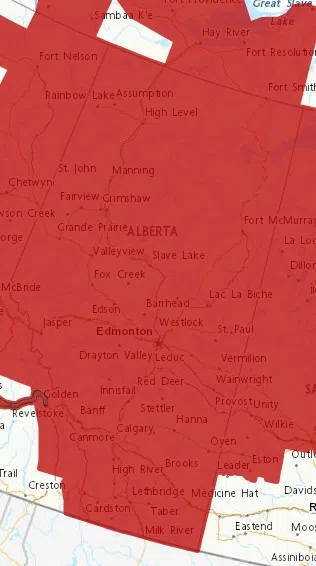Environment Canada has issued an Extreme Cold warning for all of Alberta, which means long periods of extreme cold temperatures and wind chills are expected to continue.
Officials say temperatures will hover around minus 30 degrees Celsius Thursday with wind chill values expected to be close to minus 40.
Air temperatures are expected to continue to gradually fall through the end of the week with the coldest values expected by Saturday morning.
Experts say over the weekend, morning temperatures will reach minus 40 degrees Celsius in many areas, with wind chills making it feel closer to minus 50.
Environment Canada says a slight improvement in the temperature is forecast for early next week, but below-normal temperatures are likely to continue.
Experts say extreme cold puts everyone at risk, with young children, older adults, people with chronic illnesses, people working or exercising outdoors, and those without proper shelter being particularly vulnerable.
Officials are telling Albertans to watch for cold-related symptoms such as shortness of breath, chest pain, muscle pain and weakness, numbness and colour change in fingers and toes.
Albertans are urged to dress warmly. Officials say it is best to dress in layers that can be removed if they get too warm and the outer layer should be wind resistant.
Residents are reminded that frostbite can develop within minutes on exposed skin, especially with wind chill. Experts say indicators of frostbite to watch for include colour changes on fingers and toes, pain, numbness, a tingling sensation, or swelling. If present, move indoors and begin warming.
Outdoor workers are encouraged by Environment Canada to take regularly scheduled breaks to warm up, keep moving to maintain body heat and seek shelter from the wind.
Officials also want to remind all pet owners, that if it’s too cold for you to stay outside, it’s too cold for your pet to stay outside.
Extreme cold warnings are issued by Environment Canada when very cold temperatures or wind chill create an elevated risk to health such as frostbite and hypothermia.









Comments